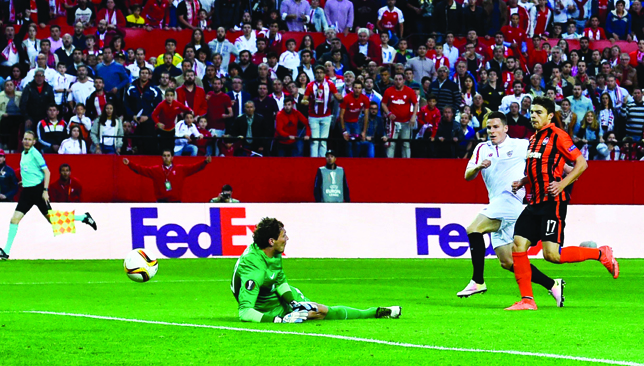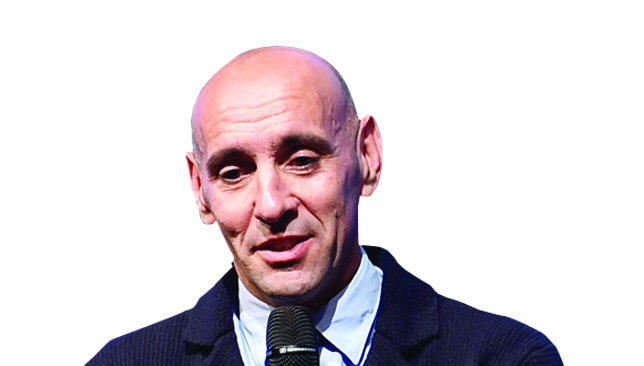
Two years ago, Sevilla outlasted Benfica in a penalty shootout to lift the Europa League trophy after a tense goalless draw. Last year, they did it again, overcoming Dnipro from Ukraine with an exciting 3-2 victory.
And this Wednesday at St. Jakob Park in Basel, Unai Emery’s side will be in the final again, aiming to claim their third consecutive Europa League crown and dismantle Jurgen Klopp’s dreams of a fairytale end to his first season at Liverpool.
The most impressive aspect of Sevilla’s consistent success – which also includes a place in next weekend’s Copa del Rey final against Barcelona – is that it has been achieved despite a remarkable turnover of playing staff which has required Emery to rebuild his team every summer.
Their triumphant captain two years ago, for example, was Ivan Rakitic, who will now be facing his old club in Barcelona colours in Sunday’s Spanish Cup final.
Last season’s hero was Carlos Bacca, the razor-sharp Colombian striker who was sold to AC Milan in the summer and whose 18 goals in Serie A provided a rare source of positivity in an otherwise glum season for the Rossoneri.
That’s not all: Jesus Navas, Alvaro Negredo, Geoffrey Kondogbia, Gary Medel and Aleix Vidal are just some of the others who have departed the Estadio Ramon Sanchez Pizjuan for new and richer pastures in the last three years.
The summer which lies ahead is unlikely to be any different. The star of the current team, free-scoring French forward Kevin Gameiro, is being heavily linked with a move to Barcelona, while powerhouse Polish midfielder Grzegorz Krychowiak has long been coveted by Arsenal. But Sevilla won’t be too upset about – once again – seeing their best players leave. In fact, they will welcome it, because they have adopted an unusual strategy which has propelled their recent success. That strategy? Sevilla are a selling club, and are happy to be so.
Whereas other clubs, motivated by lofty delusions of grandeur, would rage against that status and do everything in their power to keep their best players for as long as possible, Sevilla are different.
Instead, they accept and embrace their second-tier standing, knowing they will never seriously compete with Barcelona and Real Madrid under the current structure of European football.
And so, rather than sinking into debt by chasing a dream which would almost certainly fail to be realised, Sevilla go about their business in another manner: unearthing unknown or undervalued talent, giving those players a stage upon which to shine, and then selling them for a vast profit.
The key to that strategy, of course, is finding the right talent – the whole system only works if the players who are brought in are good enough to subsequently make millions in the market.
And this is why Sevilla’s true hero is not Gameiro, nor Rakitic, nor Bacca, and not even manager Emery. Instead, the biggest single reason for their success over recent years is one of football’s hidden gems: sporting director Ramon Rodriguez Verdejo, aka Monchi.
He has been in charge of recruitment for Sevilla since 2000, when his modest playing career as a goalkeeper for the club concluded and he moved into a new administrative role. And he has done his job so well that now, within the game, he is regarded as the king of sporting directors, reportedly knocking back approaches from both Barcelona and Real Madrid.

Monchi.
More than any of the seven managers who have worked under him, Monchi is the man responsible for identifying Sevilla’s future superstars, and ensuring they beat other potential suitors to the punch.
Often, however, there are no other potential suitors because Monchi has the happy knack of picking out players whose talents aren’t fully appreciated.
Gameiro is a good example. When he joined Sevilla from Paris Saint-Germain two years ago, the bustling frontman was hardly an unknown quantity, having played in the Champions League and earned French international caps.
But he was widely regarded as being on the wane – a ‘one-season wonder’ with previous club Lorient who had failed to make the grade at PSG and would soon sink to the status of also-ran. Now, his career has been revitalised and he could soon be playing for Barcelona.
One of the reasons Gameiro has done so well is that he perfectly fits the playing style favoured by Emery, and the recruitment process requires a delicate balance of power between the sporting director and the manager.
In a rare interview with World Soccer magazine in 2007, Monchi explained: “Sevilla are a business with the best professionals in every department, all of them complementing each other, working with the same philosophy.

“If the coach tells me he wants a short, mobile left-back, there’s no point in me buying him a tall, static right-back. But I would never buy a specific player solely because the coach likes him – the sporting directorate has to like him, too.
“He has to fit our model. If the coach suggests a player who we don’t have good reports on, we won’t sign him.”
Another notable success story is playmaker Ever Banega, a gifted Argentine international whose magnetism for off-field scrapes matched his undeniable talent on the ball, leading to him being viewed as a liability by former club Valencia.
Recognising his ability and deeming him worthy of a second chance, two years ago Monchi swooped with a paltry €2.5 million (Dh10.3m) and now Banega – who had previously played under Emery at Valencia – is once again being lauded as one of La Liga’s finest central midfielders.
Banega, like many before him, may be sold this summer. But that won’t matter. As he explained to Spanish newspaper AS in 2010, Monchi accepts his best players will leave. “Sevilla is a club that needs to sell players,” he said.
“In football there are no miracles and to compete, you need to have a very strong squad full of exceptional players.
“We are at a stage where we cannot generate much more in terms of revenue. In marketing we are earning 10 times more than years past. But these sources of revenue combined cover only about 60 or 70 per cent of our liabilities and to cover the difference, we need to sell players who can generate value for the club.”
The drawback to Sevilla’s ‘buy, develop, sell and repeat’ philosophy is that they are unlikely to ever rise above their current status.
With such a heavy turnover of staff, it is impossible to enjoy the continuity which is imperative for a very good team to become a truly elite team – being a selling club will not allow Sevilla, for instance, to ‘do an Atletico Madrid’ and establish themselves as a contender for major honours.
But on the flipside, to cite another club of similar stature, it also prevents them from ‘doing a Valencia’ and enduring the inevitable turbulence which results when clubs set their sights too high and fail to achieve unrealistic goals, a fate that has befallen Los Che.
Some may deride Sevilla’s willingness to accept their secondary status, and decry them for a lack of ambition as they happily sell their best players every year.
But with their third consecutive Europa League final beckoning and a Copa del Rey final to follow, it doesn’t appear to be serving them too badly.